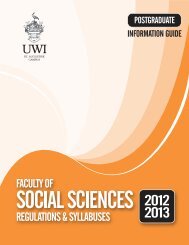Faculty of Humanities and Education (Postgraduate) - The University ...
Faculty of Humanities and Education (Postgraduate) - The University ...
Faculty of Humanities and Education (Postgraduate) - The University ...
Create successful ePaper yourself
Turn your PDF publications into a flip-book with our unique Google optimized e-Paper software.
POSTGRADUATE REGULATIONS & SYLLABUSES 2012 - 2013<br />
THE FACULTY OF HUMANITIES & EDUCATION<br />
5. develop a reflective linguistic perspective, which<br />
will contribute to pr<strong>of</strong>essional as well as personal<br />
development.<br />
CONTENT<br />
<strong>The</strong> structured content <strong>of</strong> the course locates language within<br />
the domain <strong>of</strong> educational theory <strong>and</strong> practice, showing its<br />
contribution to curriculum <strong>and</strong> instruction. <strong>The</strong> course draws<br />
upon areas <strong>of</strong> linguistics, psycholinguistics, sociolinguistics,<br />
<strong>and</strong> philosophy. <strong>The</strong> course is structured in three modules as<br />
follows:<br />
Module I - Language in <strong>Education</strong><br />
• <strong>The</strong> nature <strong>and</strong> functions <strong>of</strong> language<br />
• Language use <strong>and</strong> language knowledge<br />
• Language <strong>and</strong> learning<br />
• Language, thinking, <strong>and</strong> knowledge<br />
• <strong>The</strong> role <strong>of</strong> language in education<br />
Module II - Language in Culture <strong>and</strong> Society<br />
• Language in a social context<br />
• Attitudes to language<br />
• Language <strong>and</strong> values<br />
• Language <strong>and</strong> cultural development<br />
• Language, ethnicity, gender, equity, social justice, <strong>and</strong><br />
power<br />
• <strong>The</strong> linguistic situation in the Caribbean<br />
• Language in Trinidad <strong>and</strong> Tobago <strong>and</strong> its implications for<br />
teaching <strong>and</strong> learning<br />
Module III - Language Across the Curriculum<br />
• Language, Content, <strong>and</strong> pedagogy<br />
• <strong>The</strong> language <strong>of</strong> school subjects<br />
• <strong>The</strong> language <strong>of</strong> textbooks<br />
• Language in the classroom<br />
• Oral language across the curriculum<br />
• Literacy across the curriculum<br />
• A whole-school language policy<br />
REFERENCES<br />
Barnes, D. (1992). From communication to curriculum. New York:<br />
Penguin.<br />
Corson, D. (1990). Language policy across the curriculum.<br />
Clevedon, UK: Multilingual Matters.<br />
Craig, D. (1980). Language, society <strong>and</strong> education in the West<br />
Indies. Caribbean Journal <strong>of</strong> <strong>Education</strong>, 7(1), 1-17.<br />
Fromkin, V., Rodman, R., & Hyams, N. (2003). An introduction to<br />
language. New York: Harcourt Brace.<br />
Narinesingh, R., & Watts, M. (1992). Literacy in education: A<br />
dual exploration <strong>of</strong> reading <strong>and</strong> writing. In O. Kuboni<br />
(Ed.), Literacy in the Modern World: Proceedings <strong>of</strong> the<br />
Symposium (pp. 29-44). St. Augustine, Trinidad: <strong>Faculty</strong> <strong>of</strong><br />
<strong>Education</strong>, UWI.<br />
Roberts, P. (1988). West Indians <strong>and</strong> their language. London: CUP.<br />
Solomon, D. (1993). <strong>The</strong> speech <strong>of</strong> Trinidad: A reference grammar.<br />
St. Augustine, Trinidad: School <strong>of</strong> Continuing Studies, UWI.<br />
Wells, I., & Nicholls, J. (Eds.). (1985). Language <strong>and</strong> learning: An<br />
interactional perspective. London: Falmer Press.<br />
E. Health And Family Life <strong>Education</strong> (HFLE)<br />
Rationale<br />
<strong>The</strong> secondary school teacher confronts a range <strong>of</strong> complex<br />
issues related to adolescence <strong>and</strong> family life. This unit is designed<br />
to give teachers on the DipEd programme an underst<strong>and</strong>ing <strong>of</strong><br />
these issues <strong>and</strong> develop the ability to provide instructional<br />
experiences for their students, which would enable them<br />
to make appropriate lifestyle choices <strong>and</strong> to form satisfying<br />
interpersonal relationships.<br />
OBJECTIVES<br />
This unit is intended to help teachers to:<br />
1. underst<strong>and</strong> the philosophy, goals, <strong>and</strong> objectives <strong>of</strong><br />
HFLE <strong>and</strong> develop an appreciation <strong>of</strong> schools as health<br />
promoting environments;<br />
2. develop an underst<strong>and</strong>ing <strong>of</strong> the role the family plays in<br />
society <strong>and</strong> to become familiar with some aspects <strong>of</strong> family<br />
law;<br />
3. consider the impact <strong>of</strong> socio-cultural <strong>and</strong> economic factors<br />
on family patterns, family relationships, health practices,<br />
<strong>and</strong> lifestyles;<br />
4. appreciate the impact <strong>of</strong> population trends on the<br />
individual, family, <strong>and</strong> society;<br />
5. develop an underst<strong>and</strong>ing <strong>of</strong> human sexuality <strong>and</strong> sexual<br />
health <strong>and</strong> be able to communicate effectively with<br />
adolescents on these topics;<br />
6. be aware <strong>of</strong> conception/contraception technologies <strong>and</strong><br />
the ethical implications <strong>of</strong> these;<br />
7. explore the role <strong>of</strong> morals <strong>and</strong> values in adolescent<br />
decision-making about ethical issues;<br />
8. be reflective about themselves <strong>and</strong> their own personal<br />
value systems;<br />
9. be aware <strong>of</strong> the range <strong>of</strong> family crises that may affect<br />
adolescents <strong>and</strong> the actions that precipitate them, <strong>and</strong> be<br />
able to assess alternative coping strategies;<br />
10. acquire an underst<strong>and</strong>ing <strong>of</strong> the counselling process, be<br />
able to communicate sensitively <strong>and</strong> non-judgementally<br />
with adolescents <strong>and</strong> be able to direct them to sources <strong>of</strong><br />
pr<strong>of</strong>essional counselling;<br />
11. develop skills in designing <strong>and</strong> evaluating curriculum<br />
materials for HFLE;<br />
12. be able to use a variety <strong>of</strong> formal <strong>and</strong> non-formal means <strong>of</strong><br />
evaluating student progress in HFLE.<br />
75

















